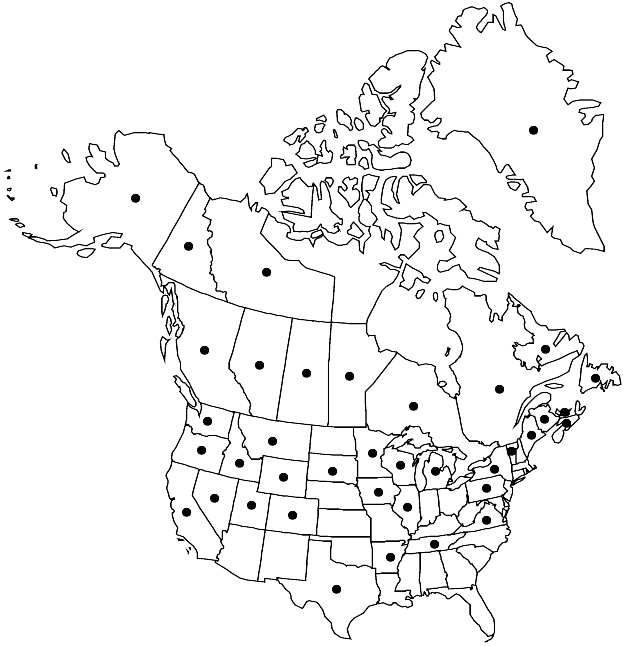Plagiomnium medium
Ann. Bot. Fenn. 5: 146. 1968.
Erect stems 2–4 cm, not dendroid; sterile stems to 8 cm. Leaves green or yellow-green, crisped and contorted when dry, flat when moist, elliptic, broadly elliptic, or sometimes obovate or oblong, (3.5–) 4–7 (–10) mm; base long-decurrent; margins toothed to near base, teeth sharp or occasionally blunt, of 1–2 (–3) cells; apex obtuse, rounded, acute, acuminate, or rarely retuse, mucronate or cuspidate, cusp sometimes toothed; costa percurrent or excurrent; medial laminal cells usually elongate, short-elongate, or occasionally ± isodiametric, (35–) 50–65 (–85) µm, less than 1/2 size near margins, in longitudinal or diagonal rows, collenchymatous, walls pitted; marginal cells linear, in 2–4 rows. Sexual condition synoicous. Seta (1–) 3 (–7), yellow to reddish or orange with age, 2–5 cm. Capsule pendent, oblong, cylindric, or narrow-ovoid, 3–4.5 mm, neck not distinct; operculum conic-apiculate. Spores 20–36 µm.
Phenology: Capsules mature late spring.
Habitat: Soil, humus, rock, tree bases in wet forests, cliffs/talus, fire-dependent forests, swamps
Elevation: low to moderate elevations
Distribution

Greenland, Alta., B.C., Man., N.B., Nfld. and Labr., N.W.T., N.S., Ont., P.E.I., Que., Sask., Yukon, Alaska, Ark., Calif., Colo., Idaho, Ill., Iowa, Maine, Mich., Minn., Mont., Nev., N.Y., Oreg., Pa., S.Dak., Tenn., Tex., Utah, Vt., Va., Wash., Wis., Wyo., Europe, Asia, Africa
Discussion
Plagiomnium medium has most often been confused with 2. P. ciliare and 7. P. insigne; see the discussions of those species. The considerable morphological variation within P. medium may also reflect confusion with at least one undescribed species. One British Columbian collection that closely resembles P. medium is dioicous and has larger leaves and laminal cells. The leaf marginal teeth in P. medium are often hooked forward when composed of multiple cells.
Selected References
None.